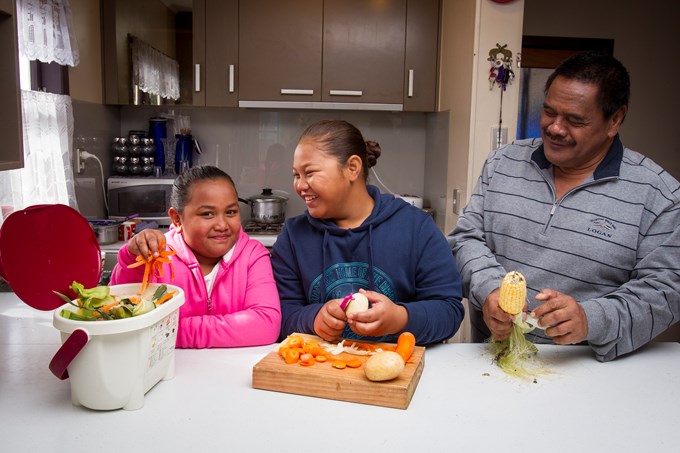In March, Papakura was the first area in Auckland to receive Auckland Council’s new kerbside food scraps collection as part of a three-bin service designed to reduce our city’s waste.
Public consultation on the first region-wide Waste Management and Minimisation Plan in 2012, showed over 70 per cent of respondents agreed with introducing a food scraps collection service to tackle the 90,000 tonnes of food we send to landfill each year.
A new kerbside food scraps collection service will be introduced across urban Auckland by 2021, meaning all urban areas will use three bins to reduce their household waste and save money on rubbish disposal.
Reducing the amount of food we waste appeals to most people – it prevents precious food from being wasted, reduces greenhouse gases in landfills, can be used as a resource to create compost to restore our soils and connects people to nature and the environment.
Why does Auckland need a food scraps service?
We have a massive opportunity to reuse the food we waste. Currently 45 per cent of household waste in rubbish bins is food, which can be recovered and treated separately as a valuable resource.
A food scraps bin, collected weekly from your kerbside, will mean your food scraps will not be wasted.
We will collect household food scraps for beneficial use, for example process it into compost or fertiliser to re-nourish our soil. Energy that can be turned into electricity could also be created from this process.
We’ve started already by rolling out a weekly kerbside food scraps service across 20,000 Papakura households in March. This will pave the way for Auckland’s first region-wide food scraps service which we are designing now.
An incentive to send less to landfill
Councillor Penny Hulse, Chair of the Environment & Community Committee, says recycling food scraps will significantly reduce household waste from 160kg to 110kg per person by 2021.
“At home, people will really notice the change with the food scraps collection. If people use their new food scraps bin along with their recycling bin, they will put a lot less in their rubbish bin, and find they will pay less for their rubbish collection as they will put their bin out less often."
“This will help us towards reaching our goal of having zero-waste to landfill by 2040.”
“Our new kerbside food scraps service is expected to avoid around 75,000 tonnes of food being wasted each year. Environmentally, diverting this amount of food scraps from landfill will help us tackle climate change too by helping reduce C02 emissions from landfills by 27 per cent.”
“Evidence from the Papakura collection shows how much potential there is to divert material from landfill. In the first month alone of the new service, more than 70 tonnes of food scraps were collected and sent to composting processing plants to be put to good use.”
What’s happening now?
Once fully operational Auckland Council’s new kerbside food scraps collection service will serve all of urban Auckland.
We are starting to plan out what is required to provide a large-scale kerbside food scraps collection service for Auckland’s urban areas. Trials in the North Shore and Papakura’s service will help inform the procurement process and identify the appropriate processing solution; including scoping out potential food scraps processing providers across a range of industries.
As part of Auckland Council’s 10-year Budget consultation, it was proposed to fund the kerbside collection of food scraps through a new targeted rate of $67 for households in urban areas. The targeted rate is based on an Auckland-wide food scraps collection and processing service and the economies of scale that will deliver value to the ratepayer.
The charge per household per year complements the user-pays refuse collection service (‘pay-as-you-throw’) which will be introduced across the region at the same time as the food scraps collection service.
Together Aucklanders will have the flexibility of a food scraps collection service and a user pays system to maximise savings by paying less for their rubbish to be collected.


